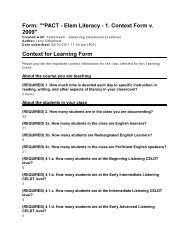The Tutoring Book - California State University, Sacramento
The Tutoring Book - California State University, Sacramento
The Tutoring Book - California State University, Sacramento
Create successful ePaper yourself
Turn your PDF publications into a flip-book with our unique Google optimized e-Paper software.
assert the mission of writing centers as places that seek to improve the writer rather than mastery of<br />
content.<br />
Discipline-specific tutors would presumably also have a stronger grasp of the conventions of the<br />
discipline than the tutee. This too can lead to a tutoring relationship in which the tutor is seen as the<br />
expert and the writer a mere disciple, a dynamic that very closely mirrors the classroom and therefore<br />
diminishes the benefits of the writing center as a space in which the benefits of collaboration is a driver of<br />
success. Furthermore, unless the tutor has access to the classroom, even the most skilled disciplinespecific<br />
tutor will not be as qualified as the student to understand the writing task. While many<br />
instructors practice the rhetorical techniques of writing effective prompts, most writing tasks are<br />
communicated not just through the written prompt but also through classroom practices, exercises and<br />
culture. Thus, it is the tutee that must be held responsible for understanding and communicating to the<br />
tutor the purpose of the writing task, something they may feel unqualified to do during a session with a<br />
perceived “expert.”<br />
According to McAndrew and Reigstad, research on the benefits of peer group work has shown<br />
that peer groups “develop their own metalanguage about writing that allows them to discuss writing<br />
processes and products in ways that teacher-supplied language rarely does” (McAndrew 9). This<br />
“teacher-supplied language,” however, seems to closely describe the kind of language discipline-specific<br />
tutors would speak. Instead of bringing in a new, quizzical voice that tutors often do when faced with a<br />
subject they are unfamiliar with, discipline-specific tutors may simply reinforce the language of the<br />
teacher. <strong>The</strong> idea behind having more specially trained tutors is that in engaging in discourse with a<br />
discipline-specific tutor, the tutee would further gain access to that discourse community. <strong>The</strong> hope is<br />
that through working with the tutor, the tutee would gain a better understanding of the content area they<br />
are studying and the conventions they are expected to use in writing. While this sounds ideal, it does not,<br />
however, allow for a space that is at least partially separated from the requirements of the instructor and a<br />
discipline in which students can engage in sincere questioning of their subject. This oversight is<br />
unfortunate as it suggests the omnipresence of the instructor and institution.<br />
What is particular about writing centers that entices so much interest from theorists is that they<br />
pose a place where the institution may be challenged because of the student-centered nature they embody.<br />
One thing that is often glossed over in many discussions of the role of writing centers and their tutors is<br />
the population that comprises these centers: tutees are students and tutors are students. What these<br />
players have in common is that they are learners, primarily engaged in a quest to gain knowledge, and<br />
they are people that almost certainly participate in various discourse communities. To further delve into<br />
the implications of this, we turn to feminist theory and how it can be used to describe the work being done<br />
in today’s writing centers. According to McAndrew and Reigstad, there are “three distinct aspects of<br />
feminist teaching” (which, it is important to note, don’t have anything to do with being male or female,<br />
oppressed or oppressor). At the center of feminist theory is the desire to encourage a deeper engagement<br />
on the part of the learner in three ways: feminist theory “redefines subject mastery as seeking knowledge<br />
on personal terms and in concert with others,” “it awakens students’ voices, encouraging and supporting<br />
them in expressing their responses and life experiences,” and “it establishes a new authority in the<br />
classroom: Students are responsible for their own learning because the learning is grounded in their life<br />
experiences” (McAndrew 7). While tutors might struggle to see how to enact the first two tenets in halfhour<br />
tutoring sessions with drop-in tutees, we might all agree that learning should be the responsibility of<br />
the learner—and is, perhaps, only successful under those conditions. We should not shy away from<br />
placing a significant portion of the responsibility for their learning process on the tutee, for it is their<br />
education for which they come to the writing center. Tutees should be expected to bring the knowledge<br />
of their own discipline with them to a session, including content and conventions, while tutors should<br />
bring the knowledge they have of their discipline as well, their knowledge of writing. We can, of course,<br />
help them determine where to find the information they need about their discipline if they do not have it.<br />
However, tutors are not simply there to reinforce the knowledge of the instructor and the institution the<br />
tutee is already coping with, but to help them find their own place as writers within their discipline. We<br />
do not need to be experts in other disciplines in order to help students understand the knowledge base and<br />
128

















